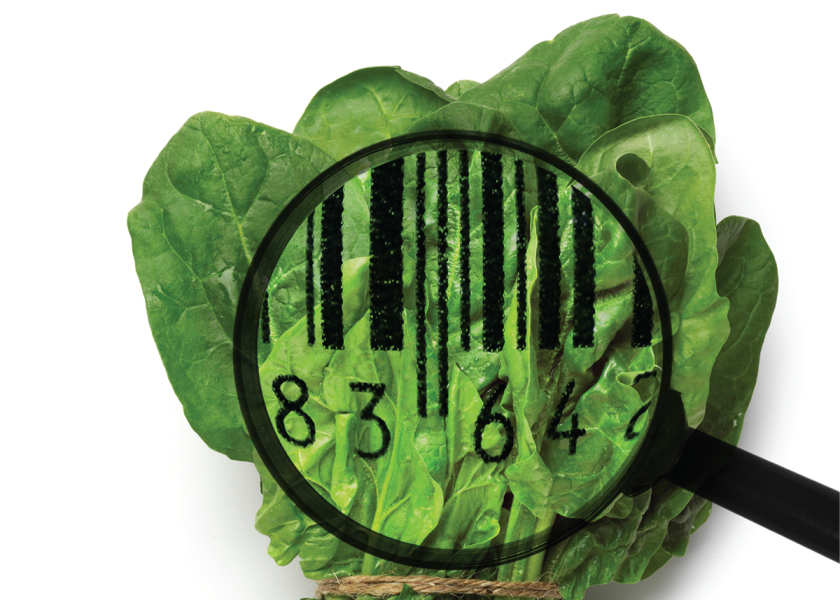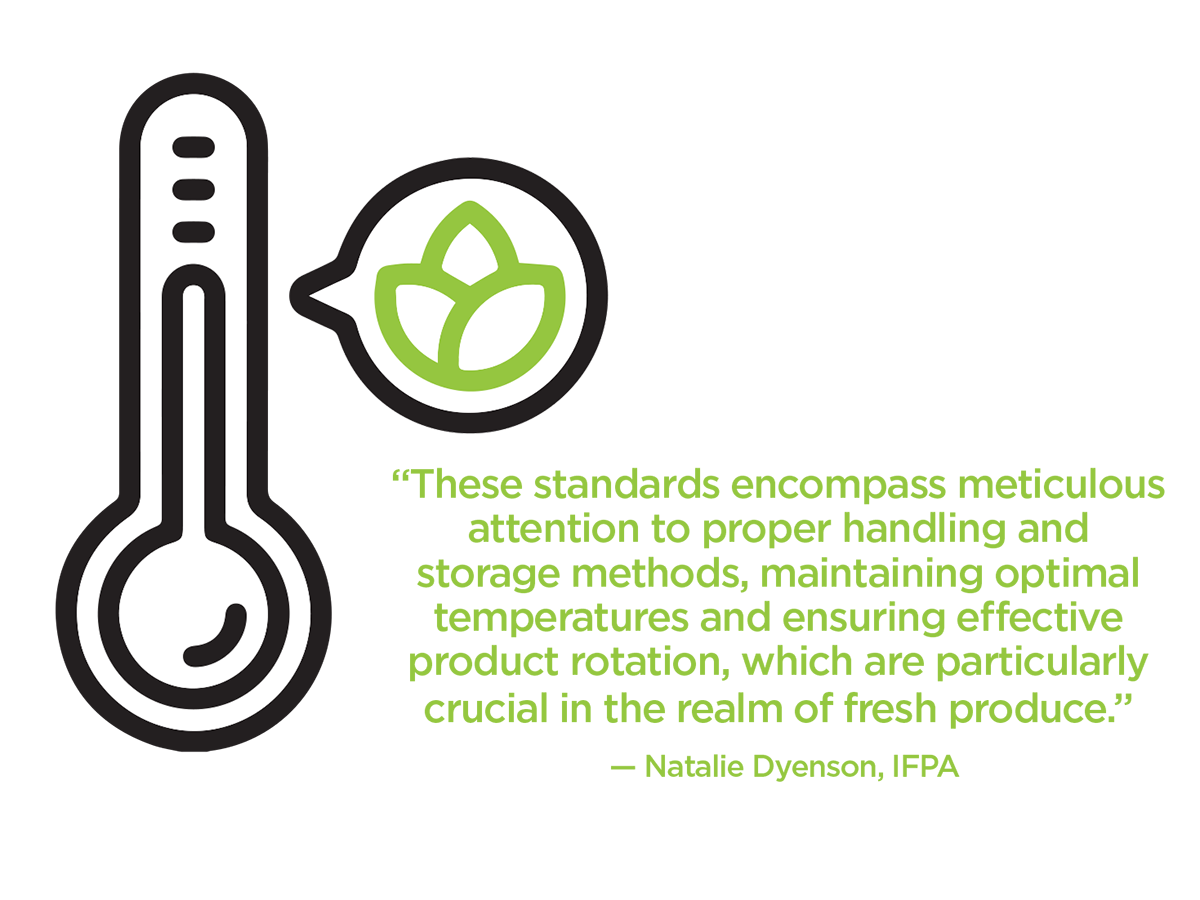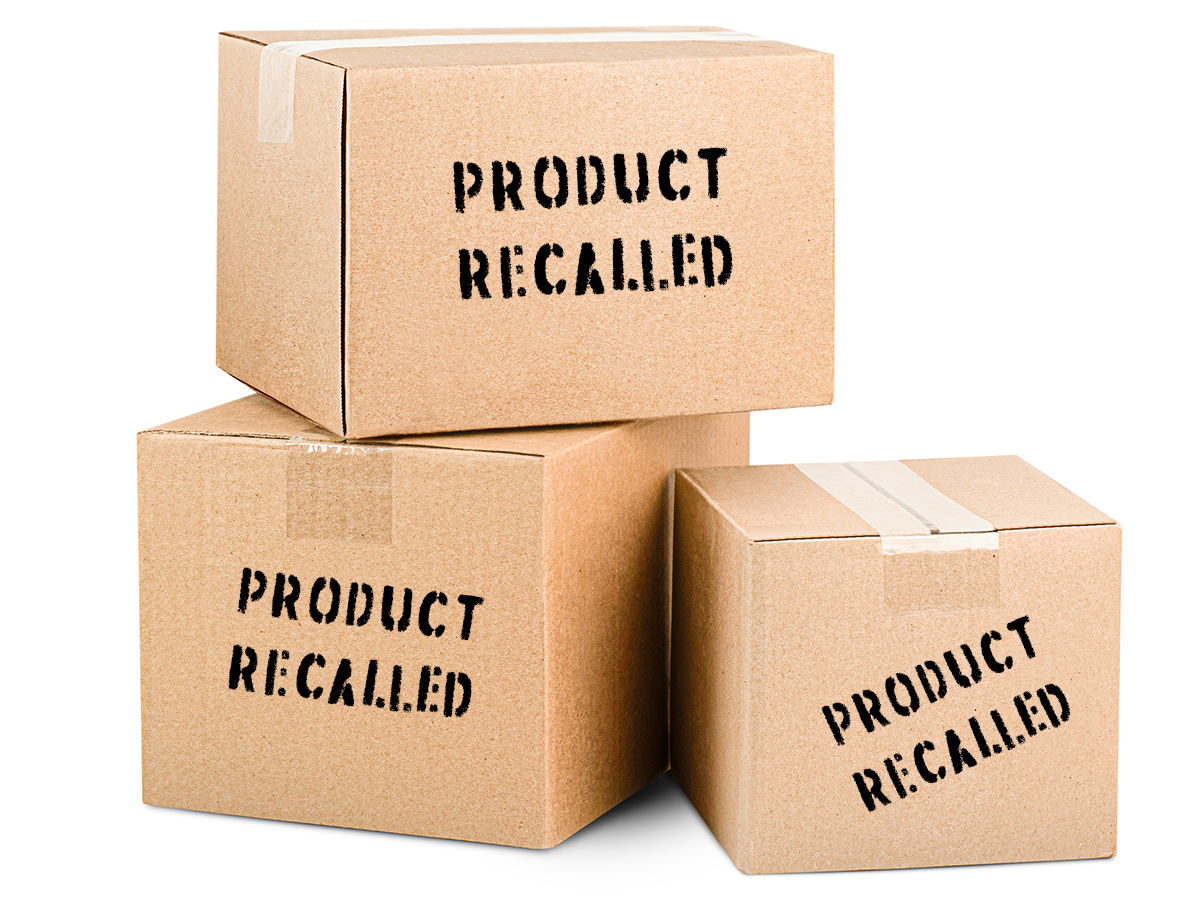Changes are coming to food safety and traceability regulations — are retailers ready?

As mandatory compliance with the Produce Traceability Initiative and the Food Safety Modernization Act 204 Final Rule looms, retailers and others across the fresh produce supply chain are readying for the Jan. 20, 2026, implementation deadline.
The Food and Drug Administration has designated critical tracking events and key data elements, or CTEs and KDEs, as essential benchmarks for compliance. CTEs serve as pivotal moments within the supply chain, requiring thorough traceability measures for food safety.
Under FSMA 204, manufacturers will need to create traceability lots, each with its own lot code assigned at distinct points in the supply chain and must link that code to other KDEs.
According to the final rule, these KDEs and several other data points must be kept and maintained for two years, with information able to be provided to the FDA within 24 hours or within a reasonable time to which the FDA has agreed.
The final rule establishes traceability record-keeping requirements for persons who manufacture, process, pack or hold foods included on the FDA’s Food Traceability List or foods that contain those listed foods as ingredients.
These new requirements identified in the final rule assume faster identification and rapid removal of potentially contaminated food from the market, resulting in fewer foodborne illnesses.
FMI, The Food Industry Association, says it has been collaborating with the FDA, as well as food and beverage trade associations and member companies, to pinpoint concerns and advocate for adjustments to make the rule more feasible for industry implementation and compliance. FMI shares information, resources and works with members to facilitate implementation and compliance with the rule.
Additionally, FMI has created a question portal to answer member traceability questions about the rule, has on-demand digital seminars and provides a FSMA resource center.
“Having a plentiful and safe supply of fresh produce is paramount not only for the health and well-being of customers, but also for the success of the store,” said Hilary Thesmar, chief science officer and senior vice president of food safety for FMI.
But retailers can’t do it alone.
"It's a collective responsibility across the entire supply chain,” Thesmar said. “The produce department represents the final link in this chain, with significant interaction with consumers. We aim to ensure that every entity in the supply chain takes responsibility for food safety while the product is under their control, actively working to prevent contamination."

Proper handling and storage
Implementing best practices for ensuring food safety standards are maintained in the produce department is a collaborative effort.
“To improve food safety protocols in the produce department and ensure product freshness and quality, grocery retailers should prioritize employee training on hygiene practices and storage procedures, conduct regular inspections and audits to maintain compliance with CTEs and KDEs, while implementing robust sanitation measures, temperature control and traceability systems,” Tyler Hove, vice president food safety, regulatory affairs and loss prevention at Sobeys, told PMG.
FSMA 204 seeks to enhance safety standards in the produce department by mandating compliance with CTEs and KDEs, ensuring comprehensive traceability and accountability throughout the supply chain.
“Additionally, collaboration with suppliers, open communication between departments, and customer education on proper produce handling are essential to mitigate risks of contamination and uphold food safety standards,” Hove said.
Ensuring standardized protocols for food safety and traceability enhance transparency, accountability and, ultimately, consumer confidence.
“In various operational settings, such as the produce department, transportation or distribution centers, adherence to best practices remains paramount,” Natalie Dyenson, chief regulatory and food safety officer for the International Fresh Produce Association, told PMG.
“These standards encompass meticulous attention to proper handling and storage methods, maintaining optimal temperatures and ensuring effective product rotation, which are particularly crucial in the realm of fresh produce,” Dyenson added.
In fresh produce, it’s also important to recognize the varying storage requirements of fruits and vegetables based on their classification.
“Different fruits and vegetables exhibit distinct storage requirements, influenced by their classification as either climacteric or non-climacteric,” Dyenson said. “While climacteric varieties continue to respire and ripen post-harvest, non-climacteric counterparts reach their peak ripeness upon picking, ceasing further respiration. This nuanced understanding is vital.”
For example, bananas are a climacteric fruit and need to be handled as such.
“Proper storage is crucial, as ethylene gas from fruits like bananas accelerates ripening. Bananas require specific temperatures to prevent overripening and bruising,” Dyenson said. “Rotation is vital to prevent spoilage, as with the adage, ‘one bad apple spoils the barrel.’ In the produce department, meticulous attention to storage, temperature and rotation ensures optimal product quality.”
FSMA 204 emphasizes proper handling and storage practices to prevent foodborne illnesses and ensure the safety of food products.
“Transportation parallels retail with emphasis on proper handling, placement and temperature control, posing significant challenges. Compliance with FSMA's transportation rule ensures truck cleanliness and prevents contamination,” Dyenson said.
Compliance with FSMA transportation regulations requires carriers, shippers and receivers to implement measures to ensure the safe transportation of food, including proper training, documentation and record-keeping.
The time is now
A crucial aspect of the rule involves a focus on traceability and the transfer of vital information among supply chain partners.
“The first step is to begin immediately. It's crucial to involve not just food safety professionals but also IT professionals,” Dyenson said. “Internal and external discussions with partners, including suppliers and customers, are essential to address data formats and exchange. This groundwork is necessary as implementing the required programming will be a significant undertaking, particularly for certain businesses.”
Conducting a thorough assessment of existing traceability systems, identifying areas for improvement and establishing standardized protocols to ensure compliance with the regulation are ways to adhere to FSMA 204.
“While larger companies like Walmart or Kroger may have internal IT teams to handle this, smaller suppliers and independent grocers may need to explore third-party platforms,” Dyenson said. “Collaboration among these platforms and companies is vital to ensure interoperability. Starting these conversations today is imperative to streamline the process.”
The importance of interoperability among different platforms and companies is also critical to success.
“Third-party platforms should collaborate to ensure seamless data exchange and compatibility across the supply chain. This proactive approach is essential for all stakeholders to adapt to the regulatory changes effectively and ensure compliance by the designated deadline in 2026,” Dyenson said.
Through collaboration, proactive preparation and adherence to regulatory compliance measures, stakeholders across all levels of the supply chain can collectively ensure the safety and trustworthiness of the products reaching consumers' tables.

How to handle a product recall
The Produce Traceability Initiative was launched in 2008 in response to food safety concerns and the need for greater transparency in the event of foodborne illness outbreaks or product recalls.
“Product recalls pose significant challenges for both retailers and producers due to the difficulty in obtaining accurate information,” Dyenson said. “Ideally, precise lot codes affected by recalls would be readily available, but consumers often discard packaging without recording such details.”
Fresh produce recalls can be challenging due to the complexity of the supply chain.
“This lack of data necessitates a process of deduction based on purchase dates and product turnover rates, often resulting in widened recall scopes,” Dyenson said. “Despite efforts to balance precision and caution, uncertainty persists due to inconsistent information from regulators or consumers.”
Traceability is also essential in the case of a recall or outbreak.
“Traceability measures mandated by FDA guidelines aid in narrowing down affected products, but ultimately rely on the quality of incoming data,” Dyenson said. “Communicating the limited impact and eventual resolution of recalls is crucial to maintain consumer trust and mitigate lasting market effects.”
All organizations in the supply chain who manufacture, process, pack or hold foods included on the Food Traceability List must be able to present traceability records of products in the event of a recall.
“Educating consumers about risk assessment and product usage is essential for informed decision-making amidst food safety concerns, emphasizing individual responsibility in managing associated risks,” Dyenson said.
Traceability initiatives aid in product recalls by facilitating the swift identification and removal of affected items throughout the supply chain.
“A traceability system offers numerous advantages. It enables effective inventory management throughout the supply chain, preventing issues of both over-supply and under-supply. Additionally, it provides clear visibility into the location of products at any given time,” said Thesmar of FMI.
Regarding traceability, “The positive development is that we're now collecting and accessing more comprehensive information, enabling more effective tracebacks compared to a decade ago, and with FSMA 204, this process will become even more streamlined and expedited," Angela Nardone, chief operating officer for Share-ify, told PMG.
Share-ify is a platform that provides a private online professional network for maintaining all the details and documents related to supplier and vendor management while complying with FSMA 204. Share-ify’s Alert-ify solution helps companies engage with their remote locations more effectively for product recalls and market withdrawals.
For a national supermarket chain like Sobey’s, “handling a product recall involves immediately initiating the recall process, coordinating with relevant authorities, conducting thorough investigations to identify the root cause, implementing corrective actions to prevent future occurrence and maintaining transparent communication with stakeholders throughout the entire recall process,” Hove said.
Outbreaks vs. recalls
FSMA 204 addresses both outbreaks and recalls by emphasizing the importance of enhanced traceability measures to swiftly identify and contain foodborne illnesses, as well as to facilitate efficient recall processes.
“Retailers and epidemiologists collaborate to gather pertinent information, facilitating swift responses to official notifications from regulatory agencies. Companies provide invaluable data for outbreak investigations, allowing epidemiologists to identify clusters and address public health concerns effectively,” Dyenson said.
Regarding handling outbreak investigations compared to product recalls, Dyenson said, “It's fascinating how signals of outbreaks often precede official announcements. During a cantaloupe incident, calls from various health departments hinted at a broader issue. Proactive investigations into purchase histories and distribution routes were conducted, aided by a model where each distribution center had a single supplier.”
The 2011 U.S. listeriosis outbreak that included Listeria monocytogenes food poisoning across 28 states resulted from contaminated cantaloupes linked to Jensen Farms of Holly, Colo., according to the Centers for Disease Control and Prevention. According to a final report on Aug. 27, 2012, there were 33 deaths and 147 total confirmed cases since the beginning of the first recorded case on July 31, 2011.
It was the worst foodborne illness outbreak in the U.S., measured by the number of deaths, since the CDC began tracking outbreaks in the 1970s.
"Traceability in the produce supply chain is complex due to involvement from brokers, wholesalers and distributors, who may lack comprehensive traceability systems. Despite exemptions under FSMA, brokers [also] play a crucial role in product distribution,” Dyenson said.
While FSMA 204 does not explicitly target brokers, they are indirectly impacted by the requirements it imposes on the entire supply chain. Brokers, as intermediaries between suppliers and buyers, play a crucial role in ensuring the traceability of food products.

The cost of doing (safe) business
The FDA acknowledges that training and adopting new technology may involve initial or ongoing expenses for businesses, yet these investments are vital for enhancing traceability programs as mandated by FSMA, with the potential to reduce costs in the long run.
"The primary inhibitor to the FSMA 204 rollout is cost,” said Nardone of Share-ify. “Another challenge stems from the complexity of understanding the regulation. Our goal is to develop a system that is highly affordable and accessible to all stakeholders.”
Difficulties with FSMA 204 between organizations may include inconsistencies in data formats, differing technological capabilities, varying levels of compliance understanding and challenges in coordinating traceability efforts across the supply chain.
“Let’s say, someone is harvesting or cooling a product and wishes to log and share that information with the initial packer, who then needs to pass it along to the subsequent entity in the supply chain. We're striving to establish direct connections to facilitate this process seamlessly,” Nardone said. “Whether they input data into Share-ify directly or upload it from their ERP system, our aim is to simplify the process across all levels of the supply chain, which presents the greatest challenge to the lowest common denominator."
As the deadline for compliance with the Produce Traceability Initiative and FSMA 204 Final Rule approaches, stakeholders are preparing for significant changes in food safety and traceability regulations.
Collaboration, proactive preparation and adherence to regulatory compliance measures are essential to ensuring the safety and trustworthiness of products reaching consumers' tables.
Through ongoing efforts and investments in technology and training, organizations can aim to streamline processes and foster transparency across the entire supply chain, ultimately safeguarding public health and bolstering consumer confidence in the food they consume.







